Fix: Windows Explorer has stopped working
Windows Explorer is a handler (a process) which enables you to explore the various screens on your Windows. If it stops working; You will get unwanted notices telling you that it has stopped working; some programs may also not open, the ones that works in accordance with Windows Explorer.
Technically, Windows explorer has stopped working error is triggered when a software, incompatible service, corruption within Windows System Files or a driver causes interference. Many users have faced this error and many will face it at some point because this process relies on its connections to other programs, and any one corrupt connection can cause it to crash. For some users, this error occurs when they try to launch a specific program downloaded from the internet (in this case) i would suggest uninstalling that program, and for some it occurs immediately after they log in (usually caused by a windows program or another start-up program). If you do not want to uninstall the program; then the explorer.exe process can also be executed via Task Manager or by Holding Windows Key and Pressing R. And typing explorer.exe in the run dialog.
In this guide; we have complied a list of several solutions that has helped the users. Go through each one of them; and when the issue is fixed; you can stop.
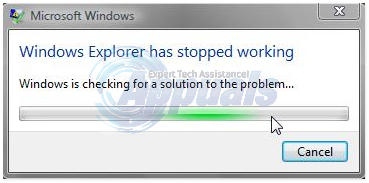
Solution 1: Scan for Malwares using Malwarebytes
Malwares, spywares and adwares can also trigger the issue when they interfere with Windows Services. The first approach should be to scan for Malwares using Malwarebytes. see steps here
After you’ve performed the steps, cleaned and quarantined all malwares, test to see if the issue has been resolved. If not, then move to Solution 2.
Solution 2: Run System File Checker Scan
A virus or corrupt third party software can damage system files. To repair them click the Windows Start button or press the Windows key on your keyboard to open the Start Menu. In the Start Menu, type cmd then right click cmd and choose Run As Administrator.
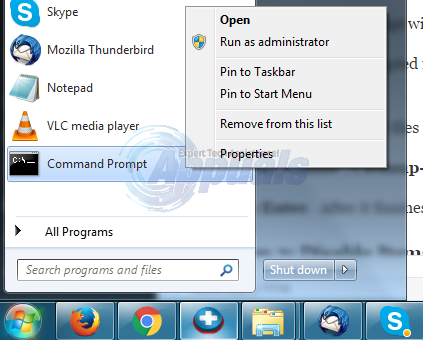
In the black command prompt window, type sfc /scannow and press Enter.
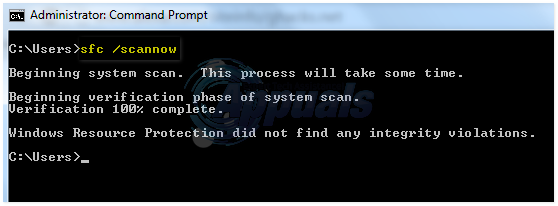
It will start to scan for corrupted files. If the scan doesn’t find any corrupted file, close the window and move on to solution 3.
If it does find any corrupted files and is unable to repair them, then in the same black windows type
Dism /Online /Cleanup-Image /RestoreHealth
and press Enter. After it finishes, test to see if the issue has now been resolved.
Solution 3: Disable Items in Right Click Context Menu
When you install a program, it often adds its item in the right-click context menu. These are called shell extensions. As the right click context menu is a part of windows explorer, any corrupt program with a shell extension can cause the explorer to crash.
To check which extension is causing the issue, download ShellExView from this link.
Open the downloaded zip file. In it, double click on shexview.exe.
Once it runs, it will load all the items. Scroll to the right and click on Company to sort the items by Company name. Choose all non-microsoft programs, sorted by company names and click the red button on the upper left corner to stop them. Check if the issue is gone. If no, then move on to Solution 4. If yes then one of the shell extension is the culprit. Now turn them on one by one by selecting them and pressing the green button, and check if the explorer crashes. The one after which the explorer crashes must be the faulty one. Leave it disabled.
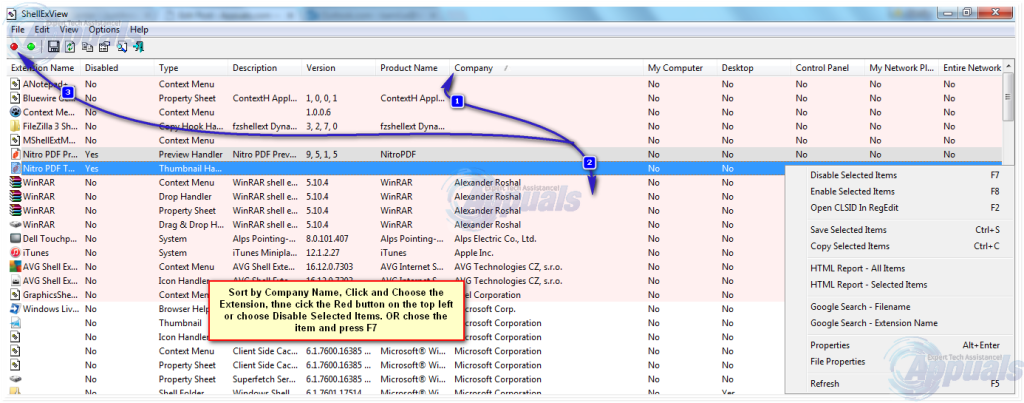
Solution 4: Check Startup Services
Any faulty startup item or service other than that of Microsoft can cause the explorer to crash. If you have monitoring software of some kind (e.g. Everest) installed, do check by disabling it if the problem goes away. If not, Hold Windows key and press R. Type msconfig and press Enter.
Go to the Services tab. Put a check on Hide all Microsoft Services. Then click Disable All. Restart your system. If the problem goes away, then its one of the services. These services will be automatically enabled when you start using programs. So there is no need to re-enable them. After you choose Disable All, click Apply/OK and reboot your PC. Test to see if the issue is now resolved; if not then move to the next Solution.
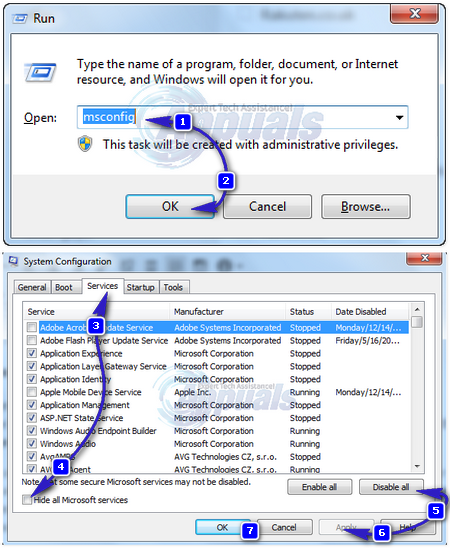
Solution 5: Check Startup Programs
Softwares that are configured to run when your Windows start can cause this issue.
For Windows 7 users, hold Windows key and press R. Type msconfig and press Enter.
Go to Startup tab and choose Disable All, Click Apply/OK. Restart your system. If the problem goes away, then it’s one of the programs. If the explorer still crashes move to Solution 6.
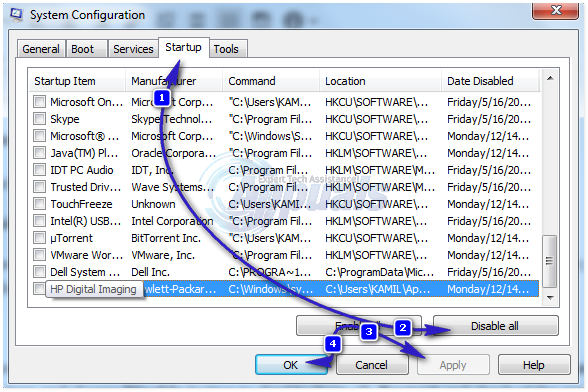
For Windows 8/8.1/10 users, press Ctrl + Shift + Esc at once. Task manager will appear. Click on the Startup tab. Now right click on each item and choose Disable button to disable them all. Restart and check of the explorer crashes. If yes, enable the startup items one by one to check on which item the explorer crashes. Leave that item disabled.
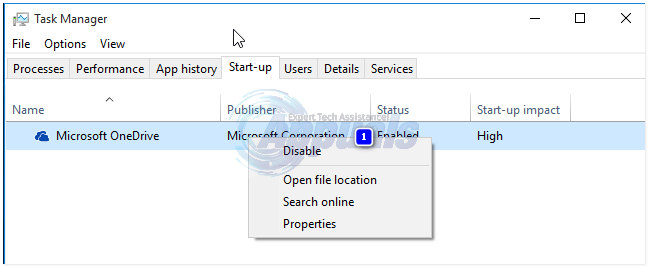
Solution 6: Disable Thumbnail Creation
A corrupt thumbnail file can cause the explorer to crash.
To disable them, hold Windows key and press E.
Click on Organize button on the top left.
Click on Folder Search Options. Go to the View tab.
Place a check next on the box that says Always show icons, never thumbnails.
Click OK. Check if the issue is still there.
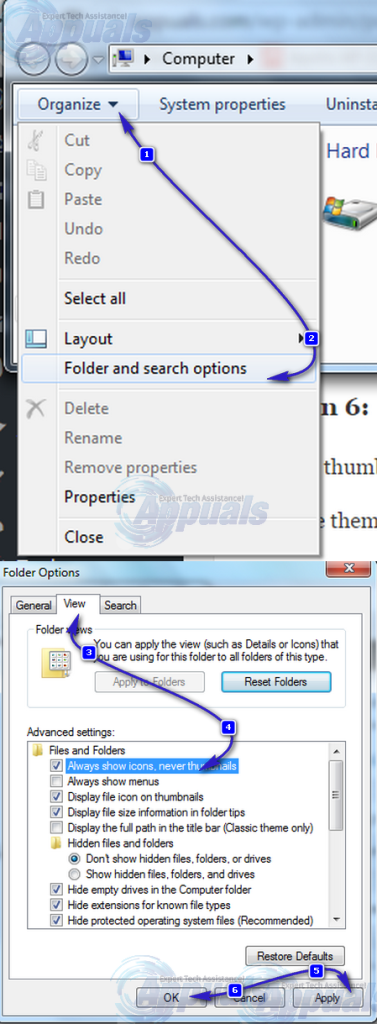
Solution 7: Update Video Drivers
Windows explorer can crash if the video driver fails to perform as it’s supposed to be. Which can be due to a corrupt or outdated driver.
To get an updated version of drivers for your graphic card, visit your graphic card manufacturer’s website. Search by the card’s model and download the appropriate drivers compatible with your operating system and system type (x64 or x86). To know them both, hold Windows key and press R, type msinfo32 and press Enter.
In the system information window, note down OS type and System type in the right pane. The downloaded files will probably be an executable. Simply run it and follow the onscreen instructions.
If you don’t have an external graphic card installed, then you will have a integrated display adapter embedded on your motherboard. Visit your motherboard’s manufacturers website (The one whose logo splashes when you power on your system) to get updated drivers for your onboard graphic adapter. In addition to operating system and system type, you will also need your system model, which is also mentioned in the System Information window. The downloaded file here will also be an executable. Simply run it and follow the onscreen instructions.
